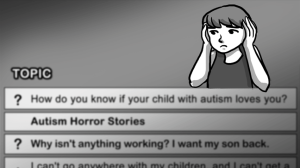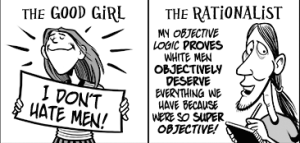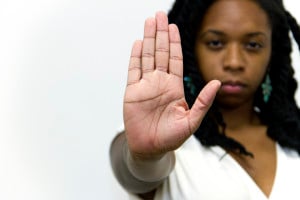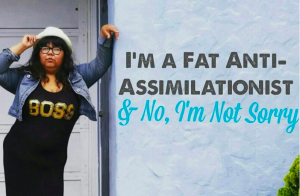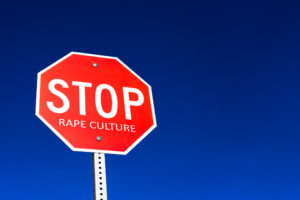
A stop sign with the words “rape culture.”
(Content Warning: sexual violence, rape culture)
“He deserves to be raped!”
I saw this comment at the bottom of an article about a serial rapist being sent to jail. But, honestly, it could be a comment on nearly any article about rape.
It’s a common sentiment that rapists should be raped, as some kind of retribution for what they did.
As someone who’s been assaulted multiple times, I get why people make those comments.
I really do understand where that anger comes from. I’ve wished that my rapists were assaulted, too.
But I’ve come to realize that, that mentality is counterproductive and incredibly harmful. The truth is that rape committed against anyone – even rapists – simply isn’t okay.
The anger that we feel is legitimate, but when we use that anger to wish rape on rapists, we actually end up perpetuating rape culture.
Here’s why.
1. It Implies That Rape Is Sometimes Deserved
When you say that a rapist should be raped, you’re saying they deserve to be raped.
That implies that rape is sometimes deserved.
See what’s wrong with that picture? We can’t say that the victim or survivor is never at fault, and then imply that some people really do deserve rape.
It implies that rape is sometimes an appropriate form of punishment – an idea that is a staple of rape culture.
Rape is often used as punishment, either consciously or subconsciously. It’s used to punish people who assert their autonomy.
It’s used to punish people who don’t conform to normative ideas of gender and sexuality. It’s used to control actions, to hurt people, and to reassert a sense of power.
When we follow the phrase “Rape is never okay!” with “Well, unless…” we’re not only being hypocritical – we’re also justifying rape in the same way rape culture does.
2. It’s a Reflection of the Prison System
Often, when people talk about rapists being raped, they’re talking about prison rape. They’re hoping that, once the rapist is incarcerated, they’re assaulted in prison – that they “get what’s coming to them.”
Prison rape is often ignored or even joked about, even among people who are usually fervently against sexual violence. And we really need to stop justifying prison rape if we truly want to dismantle rape culture.
As Sarah Ogden Trotta wrote, this attitude dehumanizes people in prison and implies that rape is sometimes an appropriate tool for punishment.
It also ignores the fact that prisons are racist and classist institutions that are often used against the most marginalized members of our society.
Rape isn’t okay, and the prison industrial complex also isn’t okay. Ergo, prison rape isn’t okay.
But we’re insinuating that it is okay when we say rapists should be assaulted.
3. Sometimes, It Eclipses the Needs of Victims and Survivors
I’m gonna be honest with you: Most of the time, when I see people wishing rape on rapists, the ones doing the wishing aren’t the victims or survivors.
This point addresses those people.
When I started telling people that I had been assaulted, I was pretty surprised at their reactions. Most of the time, those who were closest to me were incredibly angry.
And I understand why. If someone hurt someone I loved, I’d also be angry.
But I didn’t want their anger.
I didn’t want people to see my pain and seek vengeance. I wanted people to ask how I was. I wanted them to ask what I needed. I wanted them to ask how they could support me.
After all, it was my experience of assault – and I felt like I deserved to be prioritized, even just for a second.
Instead, their first reaction wasn’t concern about me, but anger toward an individual.
The violent language they used still moves through my mind today: I’m so angry, I could kill him. I hope the same thing happens to him. He’s disgusting. Who would do something like that? He needs to rot in jail.
The irony wasn’t lost on me. Even in the reaction to my rape, people still focused on him. And what’s more is the focus was on his provocation of violence, when I actually needed to be healed from violence.
It made me feel guilty. I didn’t want to hurt the people I loved, which is precisely why I kept my rape a secret for many years. Seeing them torn up with anger made me hate myself for saying anything.
It also made me feel like their anger was more important than my feelings, even though – and I’m repeating this again – it was my experience of rape.
I want to ask everyone who wishes rape on rapists:
- What else do you do?
- Do you wish healing for survivors and victims with just as much enthusiasm?
- Do you look inward and ask yourself how you can support the victims and survivors around you?
- Do you ever actually ask us how we want to be supported?
You’re entitled to channel your anger however you want. But don’t confuse your anger with actual, tangible support.
4. It Obscures the Bigger Picture
Rape is a cultural issue, which is why we refer to “rape culture.”
So, to make a positive impact, we have to look at the bigger picture when we address issues around sexual assault.
Fighting rape culture isn’t simply about wanting individuals to be punished or removed from society. When it comes down to it, nearly everyone has perpetuated rape culture at some point in their lives, either in a small or big way. I know I have.
Rapists are definitely responsible for their actions. But school systems that teach harmful rape myths also need to take responsibility for perpetuating rape culture. The so-called “justice” system needs to take responsibility for traumatizing victims and survivors.
The media needs to take responsibility for downplaying acts of sexual violence through their use of language. Communities need to take responsibility for enabling known abusers to get away with their actions.
Voters need to take responsibility for voting rapists into power.
Rapists need to be held accountable for their actions, for sure. But if we consider the bigger picture, we all need to be held accountable for the small ways we perpetuate rape culture.
When we call for individual punishment for rapists without looking at the bigger picture, we fail to truly address rape culture.
5. It Forgets That Rapists Are Humans
I’m not simply saying that “rapists are humans” because I believe they deserve human rights (although, yeah, obviously I believe that).
I’m saying “rapists are human” because we often equate rapists to monsters. Strangers. People very much unlike you and me.
Rape is a monstrous act, yes. But it’s an act that’s often perpetrated by people who, on the surface, seem very ordinary.
They can seem like “real” men,” or “real” women, or “real” non-binary people. They can seem kind and loving and gentle. They can even be feminists and anti-rape activists.
Rapists don’t go around with neon lights flashing around them, showing us who they are. Rapists don’t look a certain way.
Would you wish rape on your colleague? A friend? How about your parent or sibling?
Probably not.
But it’s very possible that your colleague, friend, or relative has committed rape. In fact, it’s likely that we all know rapists.
I’m not saying that to make you feel anxious, even though my hands are shaking as I type this. I’m saying this to remind you that nearly everyone is capable of rape.
It’s important to remember this because, if someone is accused of rape, you can’t simply say, “Nah, not them! They don’t seem like the type!” Because there is no “type.”
It’s also a reminder that each one of us needs to take responsibility during sexual encounters.
We might not think of ourselves as capable of sexual assault – most people don’t – but if we don’t consciously and consistently practice enthusiastic consent, that’s what we’re doing.
When we call for rapists to face inhumane punishment, we forget that they’re human. And when we do that, we forget that humans are responsible for creating and maintaining a society that allows rape to exist.
***
It’s natural to feel anger toward rapists. That anger could be healthy – and even healing.
But when we use that anger to justify oppressive ideas, we’re actually adding to the problem of rape culture instead of finding a solution.
[do_widget id=’text-101′]
Sian Ferguson is a Contributing Writer for Everyday Feminism and a full-time freelance writer based in South Africa. Her work has been featured on various sites, including Ravishly, MassRoots, Matador Network, and more. She’s particularly interested in writing about queer issues, misogyny, healing after sexual trauma and rape culture. You can follow her on Twitter @sianfergs and read her articles here.
Search our 3000+ articles!
Read our articles about:
Our online racial justice training
Used by hundreds of universities, non-profits, and businesses.
Click to learn more











